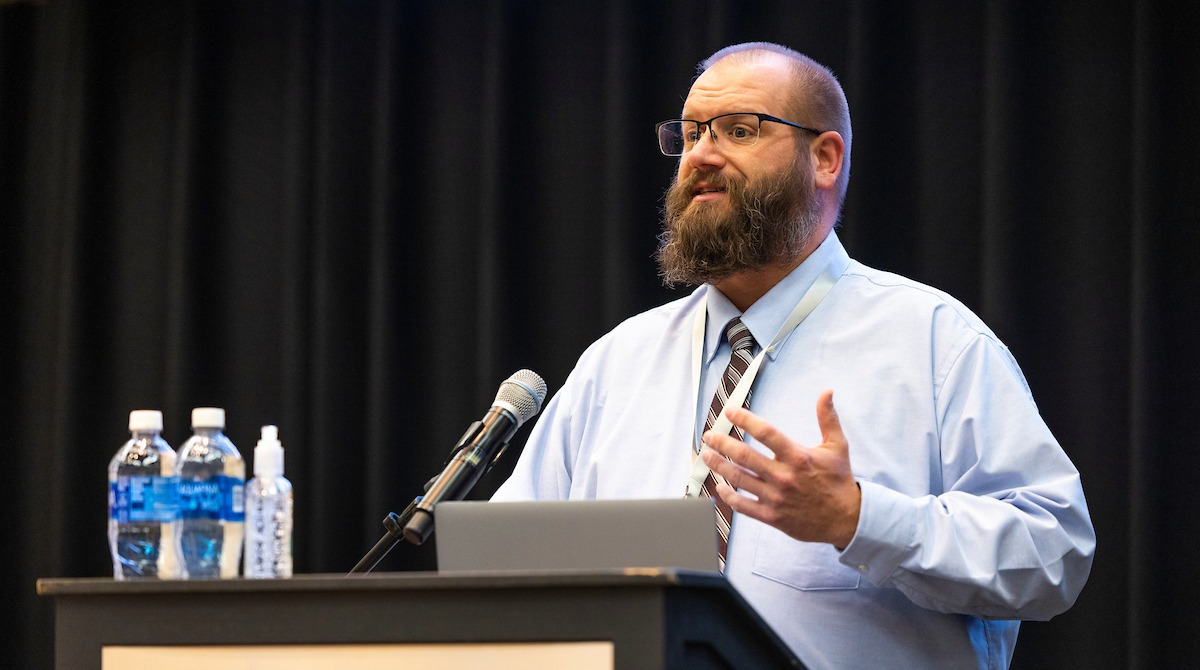The Melisa Nellesen Center for Autism at Utah Valley University (UVU) hosted its 12th annual Autism Conference on Feb. 23 and 24 in UVU’s Sorensen Student Center.

The Melisa Nellesen Center for Autism at Utah Valley University (UVU) hosted its 12th annual Autism Conference on Feb. 23 and 24 in UVU’s Sorensen Student Center.
Each year, the conference hosts a unique audience that includes autistic individuals, parents and family members, educators, mental health practitioners, and Board Certified Behavior Analysts (BCBAs).
The theme of this year’s conference was “Bridging Gaps, Improving Lives.” The two-day event featured sessions from nationally recognized experts, local researchers, autistic individuals, and family members. The first day of the conference was dedicated to the topic of autism and sexuality.
The keynote speaker for the first day was Amy Gravino, an autism sexuality advocate and relationship coach for the Center for Adult Autism Services at Rutgers University and the president of ASCOT Consulting, a mentoring service for organizations, schools, individuals on the autism spectrum, and their families.
Gravino delivered a speech titled “Autism and Sexuality,” describing her experiences navigating life and love as a woman with autism.
“We forget that autistic people are not just a collection of behaviors; we’re human beings,” said Gravino. “And sexuality is a part of human expression; it’s a part of who someone is.”
Gravino explained that it’s important to discuss the relationship between autism and sexuality because doing so can offer an extra level of protection to individuals with autism.
“For many people on the spectrum, learning to navigate the world of sexuality and relationships is like learning a whole other language,” she said. “All too often, for folks on the spectrum who do not receive comprehensive and accurate sex education, we’re missing that vocabulary to describe these things. Not only [do you miss] out on the social aspect of what’s going on around you, but you also might not have the language to describe if someone has harmed you — if someone has abused you.”
Gravino concluded her remarks by emphasizing that, despite what society might currently believe, providing autistic individuals with comprehensive sex education will always be to their benefit.
“We, [as autistic people], are often more resilient than we are given credit for,” Gravino said. “Our innocence will not be harmed if you give us information about sexuality; in fact, this will help us to make the same choices as our neurotypical peers, and it will empower us.”
The second day of the conference featured a keynote address given by Wesley Dotson, associate professor for the Special Education Department at the University of Missouri and director of Applied Behavior Intervention Services at the Thompson Center for Autism and Neurodevelopment. In his address, Dotson discussed the power and importance of choice.
“The ability to choose — to recognize multiple alternatives and make a decision about which of those alternatives is best — underlies so many of the skills that matter for building successful adult relationships and for participating in the community,” Dotson said.
For many individuals with autism, Dotson explained, the ability to choose doesn’t come easily; however, it can be taught.
“Choice-making isn’t some amorphous character trait — it’s a skill set,” he said. “It’s a way you have learned to behave in specific circumstances. It’s a way that you have learned to navigate uncertainty.”
Dotson emphasized that an individual could learn this skill set if given regular opportunities to participate in a decision-making process.
“We learn to share or self-advocate — or we learn not to — based on what happens to us in environments and with people that we have shared with and made decisions with in the past,” Dotson said. “When we have given people many opportunities to make choices … that are then respected, then that person … is much more likely to advocate for themselves.”
Dotson concluded his remarks by paraphrasing advice he received from his doctoral advisor, Jan Sheldon, and by extending an invitation to the audience.
“Freedom is the ability to choose knowing what’s likely to happen given either of your choices — to be able to choose with foreknowledge. … How will you directly support creating freedom for the people with autism in your life?”
Dotson’s keynote address replaced Dr. Peter Gerhardt’s, who was unable to present due to illness.
Learn more about the UVU Melissa Nellesen Center for Autism.